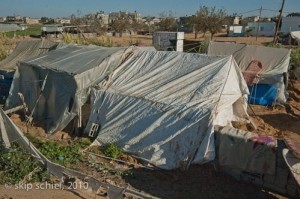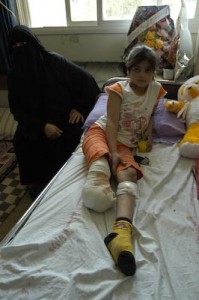Visual Arts Review: Gaza in Photographs — Up Close and Personal
Though unquestionably didactic, Skip Schiel’s images are also haunting glimpses of the perilous nature of life in Gaza. The photographs never feel invasive or forced; they simply capture moments of intimate truth between photographer and subject.
By Sarah Correia
Skip Schiel’s slide show, Eyewitness Gaza, a thought-provoking, first-hand account of contemporary life in Gaza, springs from the local activist-photographer’s moral and political determination to see and record the results of Israel’s occupation of the area and its impact on the Palestinian community. Schiel recently presented his photographs, along with his experiences taking the photos, at the Cambridge Family YMCA Theater. It was a powerful evening that combined art, journalism, and advocacy.
GAZA IN PHOTOGRAPHS — UP CLOSE AND PERSONAL ONLINE
Go here to check out Schiel’s other projects and here to see Eyewitness Gaza photos and read about plans for a documentary revolving around Schiel’s photos and his visits to Gaza. Here you will find Schiel’s blog about his experiences in the Middle East.
Since 1990 Schiel has been teaching at the Cambridge Center of Adult Education; he has also taught photography at the Landscape Institute formerly at Harvard, the Quaker Palestine Youth Program in Palestine, filmmaking for 10 years at Boston College, and various workshops at Quaker gatherings.
Raised Catholic, Schiel was fascinated by the Holy Land and deeply troubled by the violent results of the Palestinian/Israeli conflict, especially in such a sacred place.
From his first visit in 2003, Schiel has depicted the Gaza crisis with a raw yet humanitarian edge; he has stood alongside those risking their lives, demanding change in marches and protests where bullets fly. For the slide show, the walls of the Cambridge Family YMCA Theater were adorned with Schiel’s photographs—tattered bodies heaped in the streets; a child no more than 12 hospitalized from (illegal) white phosphorus burns; outraged youths protesting in the streets. Many photographs were difficult to look at—death and violence caught stark naked, through the eye of the lens.

A playground rocket shelter in Sderot Israel, a town less than one kilometer from Gaza which is hit often by Gaza rockets. Photo: Skip Schiel
Eyewitness Gaza included an introduction by Nancy Murray, President of the Gaza Mental Health Foundation and author of Rights Matter: The Story of The Bill of Rights. Murray has made nearly a dozen trips to Gaza herself since 1985 and gave a brief history and introduction to Gaza and the oppression its people have suffered, especially since Hamas’ (the most influential Palestinian militant movement) victory in the 2006 Palestinian Parliamentary elections.
Accompanied by a recording of Arvo Pärt’s Symphony No. 3, Schiel then spoke for over an hour, guiding audience members through painful yet riveting photographs taken during his many trips to Gaza. He sees the purpose of his photography to “witness suffering and then portray it to other people. ” One of the most memorably suggestive photos of despair was on the YMCA’s Theater’s wall. Entitled “Pharmacy, Al-Shifa Hospital, Gaza 2006,” the picture shows a single bottle of medication on an otherwise empty shelf, a reminder that Gaza, because of the Israeli blockade, claims that it receives inadequate supplies of medicine for its people.
Schiel ended his talk with a quotation from 19th-century Quaker, abolitionist, and feminist Lucretia Coffin Mott: “What is thee doing about it?”
Though unquestionably didactic, Schiel’s images are haunting glimpses of the perilous nature of life in Gaza. The photographs never feel invasive or forced, they simply capture moments of intimate truth between photographer and subject, a rare look into a modern day nightmare of war and oppression.
The irony is that—out of this exposure to suffering—Schiel finds flickers of vibrancy and possibility. As he writes in his blog, “may these images better balance the plethora of main media images we constantly experience: catastrophe, despair, ruination, death. May they help broaden the palette of art to include hope, faith, fun, exhilaration, antics, joy, friendship, worship, love. In midst of a troubled time, may they affirm the life force.”


